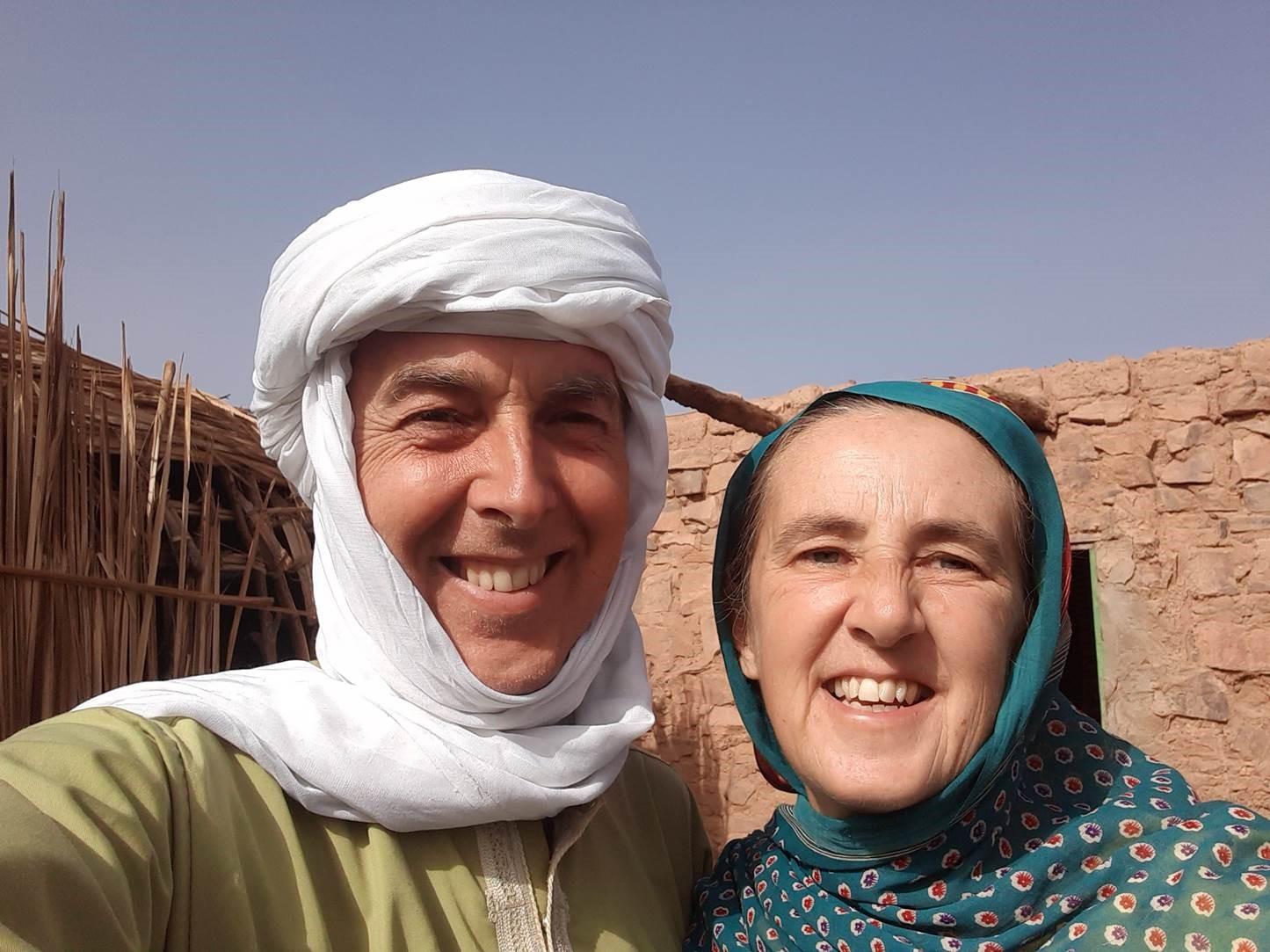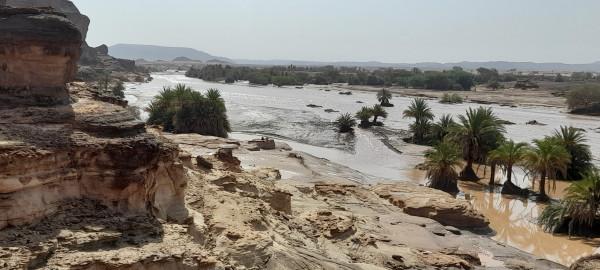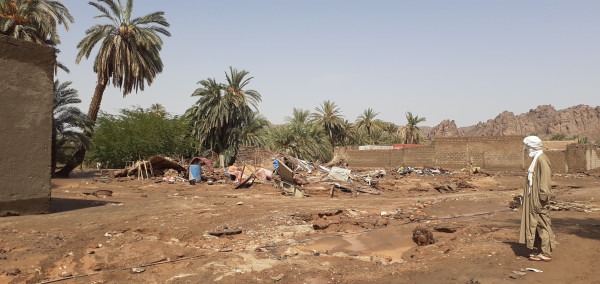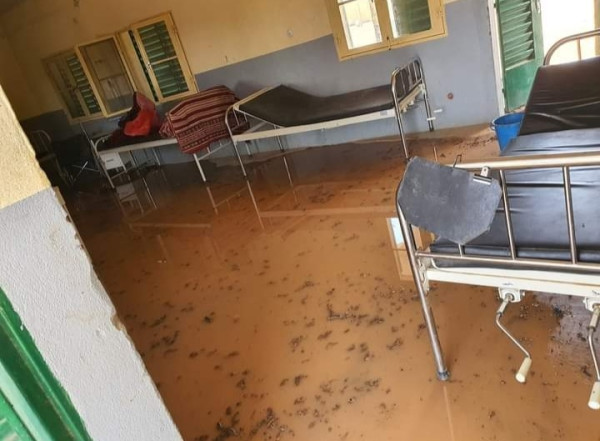Would you prefer a printable PDF? Sign up here to get PDF copies of these letters by email.
Andrea and Mark Hotchkin

September 2024
Water, a blessing and a curse.
Dear Friends,
Not surprisingly water is a precious commodity in Bardaï, mid Sahara. We use about 500 litres a week on average through the year. That is about a quarter of what an average couple would use in the UK. It is delivered after being pumped from an underground source in a large tank on the back of a pick-up truck. Most of the precious clean water is used on the garden, as our washing up and washing clothes water is not enough to keep it alive; a luxury that gives us courgettes, spinach, parsley and flowers in abundance in a raised bed garden that we made on the bare rock of the hillside that we live on. In July as the rest of Chad was cooling down with the onset of regular rains, our hot season continued with temperatures of 40-45C in the shade every day. The courgettes in our garden stopped flowering and we struggled to keep their leaves alive watering, twice a day and our water consumption rose to 1000 litres a week. The spinach, sunflowers and Zinnias coped well. As the month wore on the regular 5 calls to prayer each day were supplemented in the afternoons with extra prayers. Our neighbour told Andrea that people were praying for rain so that the wadi would fill with water from the surrounding mountains and replenish the life-giving underground supply.
On Monday the 10th of August the long hot season came to an end with a welcome shower, two days later there was a heavy rain. The wadi flooded causing some damage in town especially amongst the market stalls near to it and the mud brick homes with improvised roofing cardboard or plastic sheets that house many of the military staff and families. This was more extensive damage than usual and water came close to our colleagues' homes, it was within metres of Oyi's 75-year-old mothers house, closer than she had ever seen. The next day we walked through town and on to the church which stands on a large rock in the middle of the wadi. At one corner about 50m of newly constructed breeze block wall with steel reinforced pillars around the base of the rock had been swept way.
It continued to rain each day until on the afternoon of Friday the 16th it started to rain very heavily, the track across the small secondary wadi at the foot of our hill became a raging torrent as 4 cm of rain fell in a few hours. That night as well as the flashing lightning and rumbling thunder the main wadi suddenly filled with water coming down from hundreds of square kilometres of bare mountain. We could hear the rushing waters from our house 15 minutes' walk away.

The next morning the sky was blue and we decided to walk to a highpoint on the edge of town where we could look down on the wadi before it reached the town. The waters were no longer roaring having already receded and now were about 50 metres wide and had clearly been much deeper, all the same an impressive sight. From there we walked into the town. Nothing had prepared us for the trail of devastation as we approached the area where Mark Ortman, our team leader, lives; shop owners putting their stock of blankets, clothes and mattresses etc out in the sun to dry, a Landcruiser sunk into the road opposite a large space with a few bits of wood and fabric where a collection of homes within walled courtyard had completely disappeared. (pictured)

Once we got there, we found that our colleague had spent the night battling the rising waters and protecting the contents of his home. Water and mud had entered his courtyard and a large storeroom and a mudbrick wall between him and his neighbour, Oyi's mother, had collapsed. The old lady had been taken to safety on higher ground. The hospital too had suffered, water running through the grounds had dug channels and carried in thick mud. The water rushing out of the front gate had made a hole 1.5 metres deep, but thankfully the hospital built on raised foundations was dry.
Sunday morning, we went to church, now three quarters of the wall had been swept away as the waters had risen to about 4 metres depth, the mud-brick built church had on the top of the rock had just managed to escape. The congregation was very small as all over the town people were still drying out their possessions and making repairs. The hospital had lots of fresh sand delivered for the courtyard and sixty tons of stone and gravel to fill in the hole in front of the gate. Everyone was hoping that there would be no more rain and anxiously looking at the weather forecasts.
We left Bardaï with Mark Ortman for our planned Home Assignment in the UK and USA, so we were not present when last Saturday night 31st August it rained again. The wadi was even larger and it completely destroyed Mark and Sheryl's mud brick buildings: one breeze block room remains. Next door another mission workers' home of breeze blocks was completely ripped open and Oyi's mothers mud brick home is lost and Oyi's home is also severely damaged. The same is true for many other people. The hospital too suffered with water in the wards, and as the head nurse said, “we have no-where to see and treat patients”
An unimaginable catastrophe for people who don't have the luxury of insurance policies, all their possessions and homes are lost. The three worst floods of the wadi in over 100 years in a space of three weeks, this is the sharp end of climate change affecting vulnerable people whose carbon footprint is small and have done the least to bring about the change.

Please pray for:
- All those affected by flooding in Bardaï, that they may receive the help that they need.
- For the hospital directing team, Dr Abdelkerim, the administrator Mahamat Hissein and David the head nurse as they assess the damage and work out how to avoid the same problems being repeated.
- For the Governor and Mayor as they work likewise for the town and region
- That the rains for this season will cease.
Local Muslims and Christians alike accept this incomprehensible destruction as God's inscrutable will as did Job. But should we effectively blame God for the results of our long-term exploitation and destruction of the environment. Perhaps it is more helpful to think of God with us, Immanuel. He is with us when we suffer, consoling, and showing us how to face the future and he works with us to limit future damage where the excesses of the rich reap destruction on the poor.
May we all live responsibly so that water an essential part of our lives can be a blessing and so avoid the curse of climate change
Mark and Andrea





